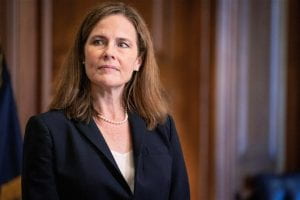By Kate Deming
Amy Coney Barrett was officially nominated by President Donald Trump on September 26th, 2020 to the United States Supreme Court to replace Justice Ruth Bader Ginsburg. Judge Barrett graduated Notre Dame Law School in 1997 with a Juris Doctor and summa cum laude. Following law school, she clerked for two judges, one of them being Justice Antonin Scalia of the United States Supreme Court. She then went on to become a Law Professor at her alma mater, in addition to practicing private law. In May of 2017, President Trump nominated her to the Seventh Circuit US Court of Appeals. Despite only being a Circuit Court judge for three years, she appears to be likely confirmed by the Republican-led Senate. But, why is Judge Barrett considered controversial?
Judge Barrett is a member of People of Praise, a patriarchal Christian community that has a strong set of principles. An article by the National Catholic Reporter stated that “The group’s practice of being accountable to a more spiritually mature personal adviser, called a ‘head’ for men and previously called a ‘handmaiden” (now ‘women’s leader’) for single women. Married women — such as Barrett — are ‘headed’ by their husbands.” It is widely believed that Judge Barrett’s religious beliefs contribute to her opposition on abortion, calling it, “always immoral.” In addition, in 2006 Judge Barrett signed onto a Right To Life advertisement part of which read, “It’s time to put an end to the barbaric legacy of Roe v. Wade and restore laws that protect the lives of unborn children.” During her 2017 confirmation hearing to the US Court of Appeals, she stated, “It’s never appropriate for a judge to impose that a judge’s personal convictions–whether they derive from faith or anywhere else–on the law.” Despite this statement by Judge Barrett, there are speculations on whether she will adhere to this principle if confirmed.
If Judge Barrett is confirmed to the United States Supreme Court, the Affordable Care Act will be the first major case that she would encounter, possibly jeopardizing healthcare for millions of Americans during a global pandemic. Judge Barrett’s views on the Affordable Care Act, though not as explicit as abortion, include opposition to the law’s individual insurance mandate that would require uninsured Americans to purchase insurance. If individuals didn’t purchase health insurance they would be fined by a penalty tax. Since Judge Barrett wrote that opinion, the mandate was eliminated by Congress. Congress eliminated the penalty in 2017 but took effect last year.
Due to the proximity to the election, there has been conflict surrounding whether we should wait for Judge Barrett’s confirmation process until after the inauguration of the next president. In early 2016 during Obama’s presidency, he nominated Judge Merrick Garland to the United States Supreme Court. Despite it being 9 months before a presidential election, Senate Republicans refused to forward the nomination because they believed it to be too close to a presidential election. Senator Lindsey Graham in 2016 following the death of Justice Scalia stated, “I want you to use my words against me. If there’s a Republican president in 2016 and a vacancy occurs in the last year of the first term, you can say Lindsey Graham said, ‘Let’s let the next president, whoever it might be, make that nomination…and you could use my words against me and you’d be absolutely right.” Two years later Senator Graham said again in an interview with The Atlantic, “If an opening comes in the last year of President Trump’s term, and the primary process has started, we’ll wait till the next election.” Now, Lindsey Graham has changed his opinion, stating in a recent interview with NBC News, “After [Brett] Kavanaugh, the rules have changed as far as I’m concerned.”
Amy Coney Barrett’s confirmation hearings began on October 12th, and the Senate is expected to vote on October 26th. Those looking to have their voices heard concerning the confirmation of Judge Amy Coney Barrett can find and contact their senators at https://www.senate.gov/senators/index.htm. As Justice Ruth Bader Ginsburg said during her final days, “My most fervent wish is that I will not be replaced until a new president is installed,”
Works Cited:
McCammon, Sarah. “A Look At Amy Coney Barrett’s Record On Abortion Rights.” NPR, NPR, 28 Sept. 2020, www.npr.org/2020/09/28/917827735/a-look-at-amy-coney-barretts-record-on-abortion-rights.
Wren, Adam. “How Amy Coney Barrett’s Religious Group Helped Shape a City.” POLITICO, POLITICO, 28 Sept. 2020, www.politico.com/news/magazine/2020/09/27/how-amy-coney-barretts-religious-group-helped-shape-a-city-422329
Barlow, Rich. “A Vote To Confirm Amy Coney Barrett Is A Vote To Kill The Affordable Care Act.” A Vote To Confirm Amy Coney Barrett Is A Vote To Kill The Affordable Care Act | Cognoscenti, WBUR, 1 Oct. 2020, www.wbur.org/cognoscenti/2020/10/01/obamacare-abortion-amy-coney-barrett-rich-barlow
Przybyla, Heidi, et al. “Trump Court Pick Amy Coney Barrett’s Past Critiques on Obamacare Face Scrutiny.” NBCNews.com, NBCUniversal News Group, 27 Sept. 2020, www.nbcnews.com/politics/supreme-court/trump-scotus-pick-amy-coney-barrett-s-past-critiques-obamacare-n1241191
“Amy Coney Barrett.” Wikipedia, Wikimedia Foundation, 5 Oct. 2020, en.wikipedia.org/wiki/Amy_Coney_Barrett
Unknown. “Home: People of Praise.” Home | People of Praise, peopleofpraise.org
Gjelten, Tom. “Amy Coney Barrett’s Catholicism Is Controversial But May Not Be Confirmation Issue.” NPR, NPR, 29 Sept. 2020, www.npr.org/2020/09/29/917943045/amy-coney-barretts-catholicism-is-controversial-but-may-not-be-confirmation-issu
Christine Eibner and Sarah Nowak. “The Effect of Eliminating the Individual Mandate Penalty and the Role of Behavioral Factors.” Commonwealth Fund, 11 July 2018, www.commonwealthfund.org/publications/fund-reports/2018/jul/eliminating-individual-mandate-penalty-behavioral-factors

